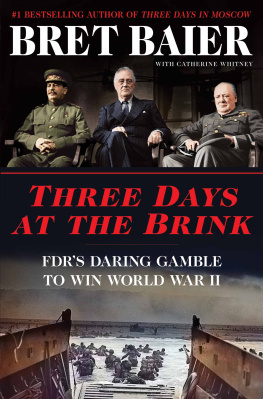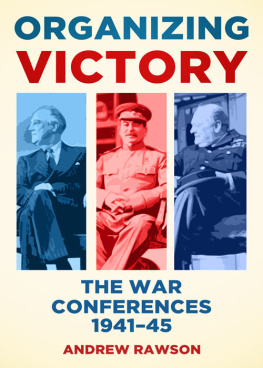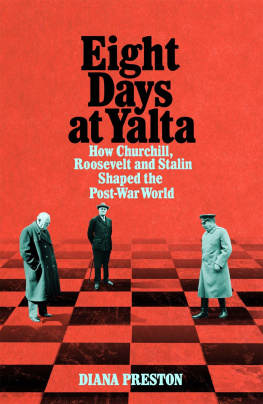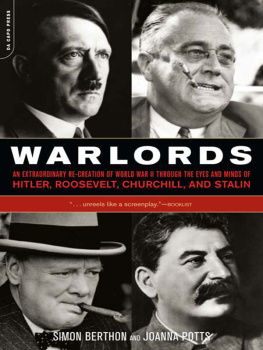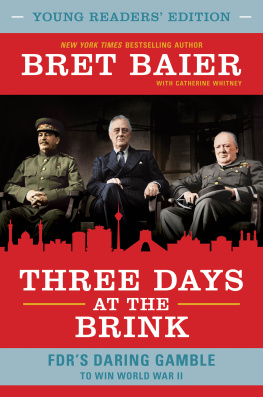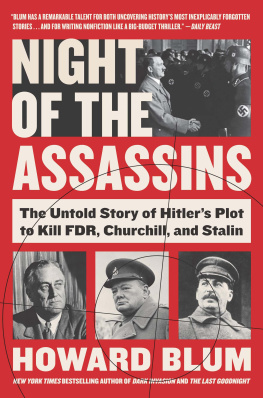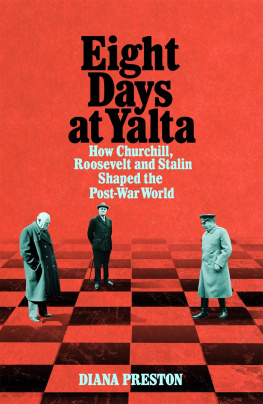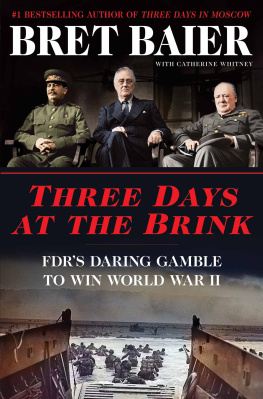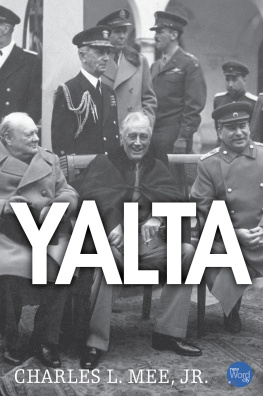Contents
Guide
Australia
HarperCollins Publishers Australia Pty. Ltd.
Level 13, 201 Elizabeth Street
Sydney, NSW 2000, Australia
www.harpercollins.com.au
Canada
HarperCollins Publishers Ltd
Bay Adelaide Centre, East Tower
22 Adelaide Street West, 41st Floor
Toronto, Ontario, M5H 4E3
www.harpercollins.ca
India
HarperCollins India
A 75, Sector 57
Noida
Uttar Pradesh 201 301
www.harpercollins.co.in
New Zealand
HarperCollins Publishers New Zealand
Unit D1, 63 Apollo Drive
Rosedale 0632
Auckland, New Zealand
www.harpercollins.co.nz
United Kingdom
HarperCollins Publishers Ltd.
1 London Bridge Street
London SE1 9GF, UK
www.harpercollins.co.uk
United States
HarperCollins Publishers Inc.
195 Broadway
New York, NY 10007
www.harpercollins.com
June 6, 2019
D ressed in a navy-blue suit and electric-blue tie, President Donald J. Trump spoke slowly, opening a historic speech touching on service, sacrifice, and how the US military alongside Allied forces saved the world. For all the bitter partisan fighting back in the US hovering over almost every aspect of the Trump presidency, this speech seemed to wholly transcend it. Marking the seventy-fifth anniversary of the D-Day invasion at the American cemetery in Colleville-sur-Mer, Normandy, President Trump directly addressed the more than 170 surviving veterans of the June 6, 1944, invasion who were in the crowd.
To more than one hundred and seventy veterans of the Second World War who join us today, you are among the very greatest Americans who will ever live, the president said. You are the pride of our nation. You are the glory of our republic. And we thank you from the bottom of our hearts. As the president turned around to look at the veterans behind him, a long-sustained applause led to a standing ovation and a few tears in the eyes of those veterans.
The past is ever-present. The nation and the world paused to commemorate the seventy-fifth anniversary of D-Day as I was completing my work on this book. At a time of great conflict and divisionwhen once again we are struggling to define who we are as nations and alliesthe leaders of the free world stood on the cliffs above the Normandy beaches where we were once united in common cause.
We are gathered here on freedoms altar, President Trump said in his remarks, and his words resonated. Normandy was the altar where nearly 10,000 Allied soldiers lost their lives, and their sacrifice was not in vain.
It was my desire to try to capture that moment of time that led me to write this book, which focuses on FDR and the three critical days of the Tehran Conference where the decision was made to launch Operation Overlord, the decisive battle of the war that came to be known as D-Day. World War II still has an influence on our lives, although it is growing more distant. According to the Department of Veterans Affairs, those who served in that war are dying at a rate of 372 veterans per day. Sixteen million of them fought; only 600,000 remain. How do we preserve the experience of that time and explain its meaning for future generations? I always tell my two sons, Paul, twelve, and Daniel, nine, that history is a living thing, and Ive found that to be true for myself. I was born twenty-six years after D-Day, but growing up it felt as if it was part of my story, too. Respecting and revering the veterans who came to be known as the Greatest Generation was standard practice. Today, as the remaining veterans of D-Day live out their final years, their resolute faces and words bring us back to our greatest legacy as a people.
Writing about history is an immersive experience. As I found with my other books, on Dwight Eisenhower and Ronald Reagan, nothing helps with the experience more than a trip to a presidential librarythis time, a trip to the Franklin D. Roosevelt Presidential Library and Museum in Hyde Park, New York. About forty miles north of West Point, above the Hudson River, the vistas are breathtaking in all seasons. Touring the grounds can put you back in FDRs time. The stately family home, now showing the wear of age, is just a few yards from the museum, and walking the long driveway its easy to picture Roosevelt, his legs shrunken by polio and encased in steel braces, struggling for hours at a time, trying to walk again. He never succeeded, but he also never stopped trying.
Driving the backroads of the property, one can imagine FDR doing the same in his 1936 Ford Phaeton Convertible with special hand controls. Mounted on the steering column is a device that produced lit cigarettes at the push of a buttona one-of-a-kind feature. He loved that car and often drove along the side roads and hills of Hyde Park, taking the curves at breakneck speed.
On a hill at the easternmost corner of the property is Top Cottage, which FDR built as a private retreat. The long, flat porch of the modest cottage was the setting of a picnic the Roosevelts hosted for King George VI and Queen Elizabeth of England in 1939. (FDR drove them there from the main house himself, and after that ride the queen vowed to never get back in a car with him again.)
But the true work takes place in the reading room of the library, with its aged books lining the walls. There are over 17 million documents in the FDR archives, and almost one million of them are available digitally. But there is something special about being there and holding the documents in your hands. Unlike at the Eisenhower Library, gloves are not required. The archivists thought gloves would make it hard to turn pages, which is true. Here are the drafts of speeches, always of special interest to me, with edits scribbled in Roosevelts hand; the urgent cables at critical moments of the war; the correspondence between the president and Winston Churchill and Joseph Stalin, some of the letters in longhand. Collected in large bound books are the records of the Tehran Conference with Winston Churchill and Joseph Stalin, the centerpiece of this book. The firsthand accounts of observers and translators bring one into the room as they fiercely debated the wisdom of a cross-Channel invasion on western Europe. Trying to put the reader in the room is what the Three Days series is all about.
In Tehran, the complex relationship of the three men was on full display. Churchill, a man of great passion and conviction, had been in this war longer than the others, and felt his unique position gave additional legitimacy to his voice. After all, Britain had stood firm against Hitler while the United States was trying to avoid the war and the Soviet Union was signing a non-aggression pact with Germany. Stalin, a dictator whose hidden depths masked his true agenda, could be an uncomfortable partner, given his history. However, the sacrifices endured by his countrymen, with millions of lives lost to Nazi aggression, gave his proposals special standing. FDR as the mediator, and in the eyes of the others the final word, had an agenda complicated by the drain on American lives and treasure of the Pacific War and the knowledge that any invasion of western Europe would occur on the backs of American soldiers. Their frank, often brutal, conversations are a revelation. The sheer human drama of this meeting, at the conference table and behind the scenes, is a time capsule that when broken open, foretells the next three quarters of a century.
Much has been written about this period. A staff member at the FDR Library told me he thought Roosevelt was the most written about person in American history, and I can understand why hed think that. Many great historians have explored aspects of his life and contribution. I dont aspire to match the genius of historians, but intend to put my personal journalists spin on the great events of Roosevelts day, culminating with the Tehran Conference and the decision to launch Operation Overlord. That meeting may have won the war, but it also set the stage for the beginning of the Cold War. I am not a historian. I am a reporter of history. And this book, like the other two in the series, hopefully sheds light on a crucial moment in time and one of Americas most consequential leaders.
Next page
